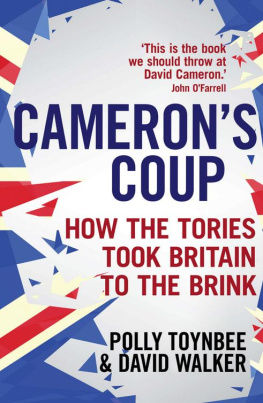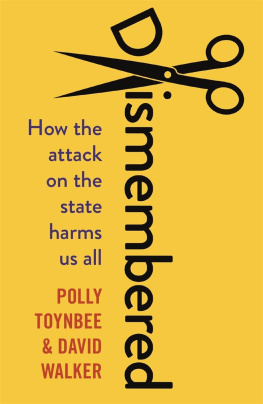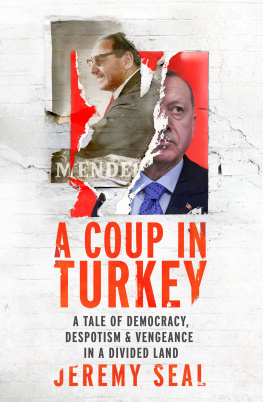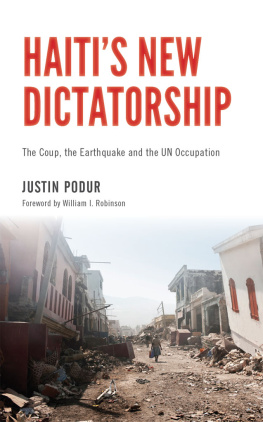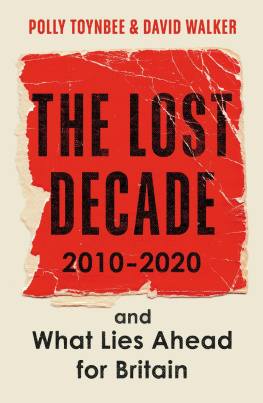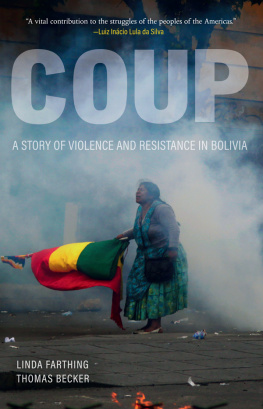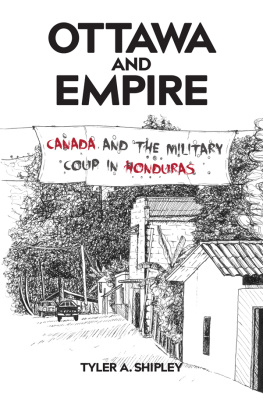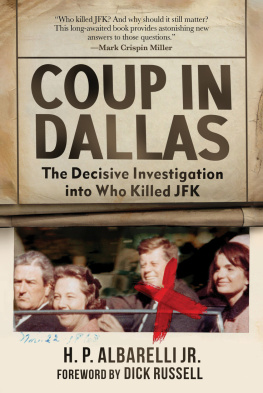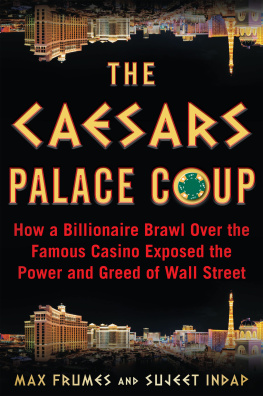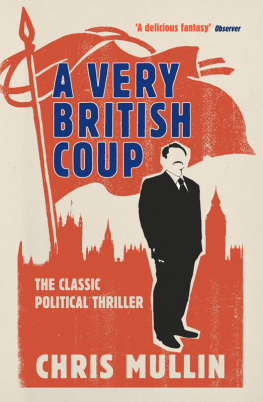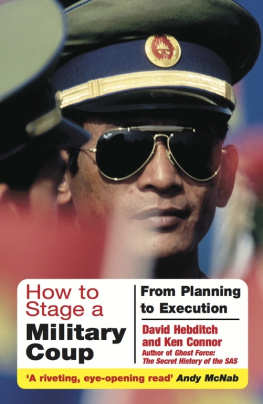Toynbee Polly - Camerons Coup: How the Tories Took Britain to the Brink
Here you can read online Toynbee Polly - Camerons Coup: How the Tories Took Britain to the Brink full text of the book (entire story) in english for free. Download pdf and epub, get meaning, cover and reviews about this ebook. City: Array, year: 2015, publisher: Guardian Faber Publishing, genre: Politics. Description of the work, (preface) as well as reviews are available. Best literature library LitArk.com created for fans of good reading and offers a wide selection of genres:
Romance novel
Science fiction
Adventure
Detective
Science
History
Home and family
Prose
Art
Politics
Computer
Non-fiction
Religion
Business
Children
Humor
Choose a favorite category and find really read worthwhile books. Enjoy immersion in the world of imagination, feel the emotions of the characters or learn something new for yourself, make an fascinating discovery.
- Book:Camerons Coup: How the Tories Took Britain to the Brink
- Author:
- Publisher:Guardian Faber Publishing
- Genre:
- Year:2015
- City:Array
- Rating:5 / 5
- Favourites:Add to favourites
- Your mark:
- 100
- 1
- 2
- 3
- 4
- 5
Camerons Coup: How the Tories Took Britain to the Brink: summary, description and annotation
We offer to read an annotation, description, summary or preface (depends on what the author of the book "Camerons Coup: How the Tories Took Britain to the Brink" wrote himself). If you haven't found the necessary information about the book — write in the comments, we will try to find it.
Camerons Coup: How the Tories Took Britain to the Brink — read online for free the complete book (whole text) full work
Below is the text of the book, divided by pages. System saving the place of the last page read, allows you to conveniently read the book "Camerons Coup: How the Tories Took Britain to the Brink" online for free, without having to search again every time where you left off. Put a bookmark, and you can go to the page where you finished reading at any time.
Font size:
Interval:
Bookmark:
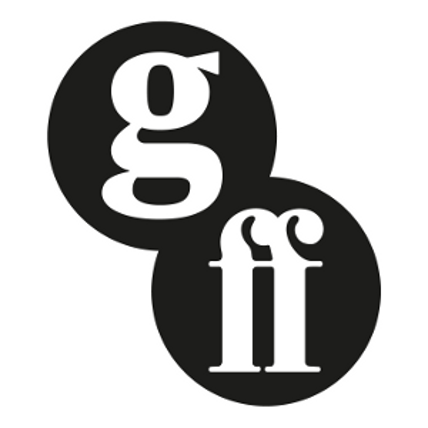
Asked why he wanted to be prime minister, David Cameron said, Because I thought Id be good at it. He wasnt. He bears direct and personal responsibility for (nearly) breaking up the UK, because of who he is and the policies he pursued as prime minister. With chillaxed nonchalance, what his government did on tax, spend and benefits, and housing, health and education, prised further apart region, class, generation, gender and race, driving deeper wedges between town and country, old and young, deserving and undeserving, lucky and unlucky, left and right. And, as it turned out, between the nations that make up the UK.
Cameron was in a coalition, but for most purposes the Liberal Democrats were a sideshow. Besides, this book is not about the Westminster charivari, the stuff that excites Nick Robinson on the News at Ten, the ins and outs or the mini-dramas that engross political journalists. Those arent always insignificant but as with our book The Verdict, on the Labour years we want to audit what they did as a government, what effect their actions had on peoples lives and paint a picture of the country under their rule.
We arent naive. Many increasing numbers doubt the efficacy of politicians and policymakers, if they pay them any attention at all. People get on with their lives, talk about the weather, and fail to see connections between services, tax, job or wages and the decisions made by MPs and ministers. However, the Scottish referendum showed brilliantly how engagement might be electrically charged, albeit over a direct and straightforward question. By contrast, citizens everyday experience of politics is rarely going to be as exciting, but it matters. One purpose of this book is to show how much.
We focus primarily on what the Conservatives did, yet its hard not to query the personality at the top. One puzzle is that, unlike Margaret Thatcher, what you saw was not what you got: Camerons strong ideological impulses were usually kept from view. He breathed an effortless trajectory from Eton to Oxford, to public relations and a safe seat in Witney. Harold Macmillan is supposed once to have been his role model; a picture of SuperMac hung in his office. For a while, Cameron tried to paint himself as a modern version of that other old Etonian, who had been a Keynesian, a builder of council houses and a prime minister deeply committed to the integrity of the country, from Scottish castles to Stockton-on-Tees to deepest Sussex.
There is no resemblance. Cameron sees the world through the narrowing prism of a social set and sectional interest. He trod the world stage as prime ministers do, but without any identifiable strategy, sense of history or grasp of long-run national interest; the idea of his turning to the classics or even Jane Austen for inspiration and proportion, as Macmillan did, is unlikely. At home, it was government by and from a coterie, half-barricaded in its southern English fastness, half-floating across the yacht-filled sea of globalised money.
The Tories came to power during what his partisans called a national crisis, claiming it demanded ruthless austerity. With admens fluency, they produced sound-bite phrases, notably were all in it together, but never tried to imagine the nation, let alone seek to strengthen unity in adversity. Deep and disturbing trends in capitalism left them indifferent. The fundamental promise of modern liberal economies to make the broad majority of people gradually better off over time is being called into question, says Clive Cowdery, chair of the Resolution Foundation, an independent thinktank that works to improve the lives of people on low incomes. Such adverse dynamics demand understanding and political response.
Labour had taken a million children out of poverty. That progress has now gone into reverse. The great recession would have taken its toll across regions and classes but a good government would have looked to protect the weakest. Instead, they are the ones who have borne the brunt of deficit reduction, ministers bent on turning public opinion against the poor. The character of a government shows in the choices it makes about the distribution of pain. Whatever the balance of arguments about austerity, concerted assault on the bottom third of society is what must brand Camerons reputation.
Writing about modern Britain, you have to rely on certain institutions, whose worth and reliability counterbalance the temptation to say everything is going to hell in a handcart, strong though that remains. We have used their work copiously, not always with full acknowledgement. Of course they include the Guardian, but also the Financial Times and its first-rate columnists such as John Kay, Martin Wolf and Janan Ganesh. Initials that crop up frequently include ONS (Office for National Statistics), PAC (House of Commons public accounts committee) and NAO (National Audit Office), and an organisation that has become de facto part of the constitution, so irreproachable its data and so incisive its analysis, the Institute for Fiscal Studies (IFS). Other indispensable sources are the pollsters, notably Ipsos MORI and one of the greatest of charities, the Joseph Rowntree Foundation (JRF).
Other initials include DWP (Department for Work and Pensions); FTSE (Financial Times Stock Exchange) 100, the list of companies on the London Stock Exchange with the highest capitalisation; NIESR (National Institute of Economic and Social Research); OECD (Organisation for Economic Co-operation and Development); OBR (Office for Budget Responsibility) and BIS (Department for Business, Innovation and Skills).
Take any route north and west of Oxford and, once across the ring road, you are soon in Cameron country. Despite his name, this is a long way from Scotlands craggy passions and collective self-assertion. This is also Clarkson country, with all the petrol-headed disdain for planet and public interest the TV personality stands for. He lives in Chipping Norton, which is also home to Elisabeth Murdoch and her fathers favourite, Rebekah Brooks, the newspaper executive who had simply no idea how her brutish reporters were hacking and harassing.
Lush fields, luxuriant hedges and Jurassic yellow cottages announce the Cotswolds. Here and across England, farmers have done well their real income after costs up by 1bn between 2010 and 2013. Prime arable land grew in value by 270 per cent, outstripping gold and even the Knightsbridge flats we visit later. The cause, reported Savills Estate Agents, has been rising global food demand, climate change and foreign investment attracted by liberal British laws. Landowners in Scotland cashed in, too: prime fishing beats sold for 10,000 per salmon; business has never been better, say organisers of 15,000-a-day luxury hunting and shooting.
Here journeys are calibrated in hours by car from Notting Hill about one and a quarter. Take a left beyond Woodstock and you reach Cornbury Park, which in early August hosts Wilderness. Theres nothing wild about this annual music and arts festival, except its prices. To hire the Royal Safari Tent with its antique oak flooring, king-sized beds with memory foam mattresses, 200 thread-count Egyptian cotton bed linen, dimmable overhead lighting, botanical toiletries and complimentary bouquet of flowers costs 2,000 for three nights plus 150 entry. Nicknamed Poshstock, its a festival, joked one reviewer, where performers sing about Texas trailer parks to an audience more used to deer parks, where bands delight the offspring of bankers with folk laments for the decline of Clydeside.
Among Wilderness fans is the governor of the Bank of England and he does not need to rent a tent. Cornbury Parks sumptuous grounds belong to Mark Carneys sister-in-law, Lady Tania Rotherwick, and her husband, Robin Cayzer, 3rd baron Rotherwick, a hereditary Tory peer. Cayzers first wife belonged to the McAlpine clan, now a long, long way from the glens and generous donors to the Tory party. Such is the interwoven nature of politics, high finance and class in Camerons country, which yes voters in the Scottish referendum found so oppressive.
Font size:
Interval:
Bookmark:
Similar books «Camerons Coup: How the Tories Took Britain to the Brink»
Look at similar books to Camerons Coup: How the Tories Took Britain to the Brink. We have selected literature similar in name and meaning in the hope of providing readers with more options to find new, interesting, not yet read works.
Discussion, reviews of the book Camerons Coup: How the Tories Took Britain to the Brink and just readers' own opinions. Leave your comments, write what you think about the work, its meaning or the main characters. Specify what exactly you liked and what you didn't like, and why you think so.

